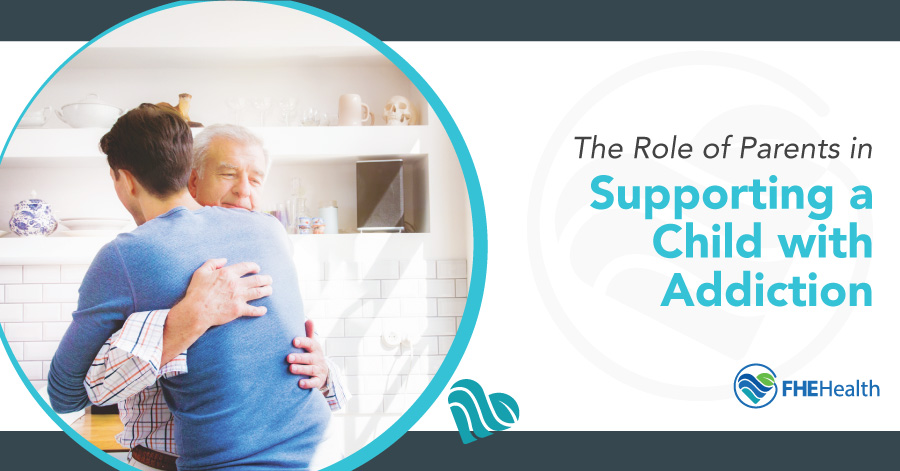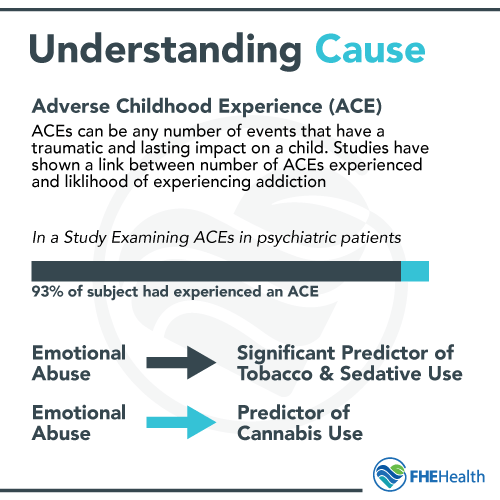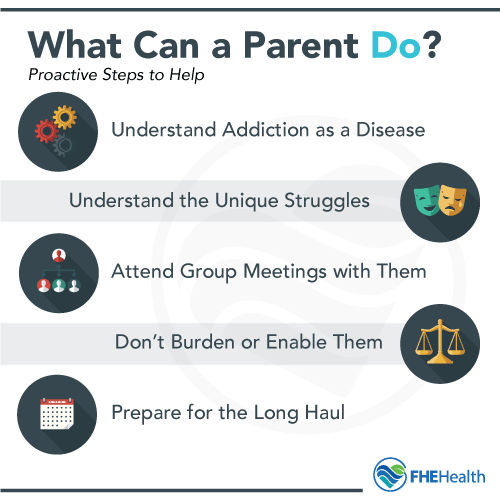
There are few things more difficult than supporting someone in rehab for drugs or alcohol, and that goes tenfold when the case involves a close family member. But when it’s your child who’s struggling? Arguably, this is the toughest situation of all, and it can take tremendous emotional strength to overcome the challenges associated with it.
Having a child of any age who’s struggling with substance abuse and addiction can be extremely painful. Most commonly, we hear about the foundations of addiction being passed down from parents to children. This is certainly a complex situation but one that’s more frequently covered by articles and research. The problem with this is that there are intricacies that affect a parent dealing with their child’s addiction that are different from those that exist in the opposite situation, yet there are far fewer resources out there addressing the former.
Courtesy of FHE Health (formerly known as the Florida House Experience), here’s a breakdown of what it’s like to have a child facing rehab for addiction and what you, as a parent, can do to support them.
Dealing with a Child Who’s in Rehab
The bond of an immediate family member is unique in that in most cases, it’s extremely close. Family members can be vulnerable and let their guard down with one another, creating a unique environment for addiction.
Having a child struggling with an addiction can wreak havoc on the dynamics of a family. Often, parents who are accustomed to trusting and being trusted by this person will be shocked and emotionally damaged by the changes they observe. This can manifest in a variety of different ways, ranging from the addict gradually becoming more distant and secretive to more extreme circumstances like being physically threatened, lied to, or otherwise let down by an addicted child.
How Does Addiction Start?
 There are several ways a person can start abusing drugs or alcohol, and many are caused or complicated by family dynamics. When it comes to children — not just minors but adult children, too — long-term exposure to addiction at home and abuse and neglect that often accompanies familial instability can be a key cause.
There are several ways a person can start abusing drugs or alcohol, and many are caused or complicated by family dynamics. When it comes to children — not just minors but adult children, too — long-term exposure to addiction at home and abuse and neglect that often accompanies familial instability can be a key cause.
Adverse Childhood Experiences, or ACEs, can help explain addiction that starts at an early age. These are traumatic experiences, often at home, that become the roots for problem behaviors that can manifest in the form of crime, addiction, and other issues in early adulthood and later.
There have been studies that show a strong link between the number of ACEs experienced by a given individual and their likelihood of abusing drugs and alcohol later in life.
When this exposure is from a parent or other close family member, it’s likely that the person is enabling the seeds of addiction in a child. Growing up around parents who abuse drugs and alcohol can make it easier for a child to access addictive substances and teach them that this behavior is normal.
Whether or not you, as a parent, have had your own struggles with addiction, it’s important that you don’t blame yourself for your child’s substance issues. It’s not productive to wonder retrospectively what you could’ve done differently to prevent reality. What you should prioritize is your role as the parent of an addict: Support them and encourage them to get help.
What Can a Parent Do to Help?
 Let’s imagine that your child has entered a treatment program, either by their own volition or mandated by law. Now that your child is in rehab, what can you actively do to help?
Let’s imagine that your child has entered a treatment program, either by their own volition or mandated by law. Now that your child is in rehab, what can you actively do to help?
This is a common question asked by parents of addicts. Your child is still a major part of your life. How do you get them the support they need for an effective process of treatment and recovery?
Understand Addiction as a Disease
A lot of the stigma placed on addiction comes from a general misunderstanding of the disease. Addiction is just that, a disease. It’s not a moral failing, and it’s nobody’s fault. Instead of wondering why your loved one is in this situation, look ahead to find solutions, or look inward and ask yourself how you can provide unwavering support in this part of their journey.
Understand the Unique Struggles that Your Child is Facing
It’s unlikely that you’ll truly be able to empathize with someone in rehab, especially if you don’t have personal experience with drug and alcohol abuse or addiction.
With this in mind, the support you’ll be able to give is directly related to your understanding of the way addiction manifests and what your child is going through on a daily basis.
From the pain and struggle of detox to the frustration of trying to develop recovery strategies that stick, the more you research what a person in rehab goes through, the better you’ll be able to understand and unconditionally support them.
Attend Group Meetings with Your Child
At FHE Health, we allow family members to attend their loved one’s meetings (with their consent, of course) and there’s a reason for this. Showing your support and being an active participant in their recovery is one of the most effective ways that you can fulfill your obligations as the parent of an addicted child.
It can be hard supporting someone in rehab, but you’ll need to resist the urge to take a step back and hope everything works out. You’ll be the best asset when you show your support by being there in person and participating in your loved one’s growth, from their first meeting in residential treatment to outpatient support groups and 12-step groups.
To prepare yourself to sit in on these types of meetings, check out our overview of group therapy options and some of the topics that these groups will cover.
Don’t Burden or Enable Them
When your child is in rehab, you have to strike a balance. How harsh or accepting should you be with them? If they slip up, how should you react? This is part of the reasons why being an active part of their experience in rehab is so important. If you are able to participate in their rehab, you’ll be better prepared to react to things that occur.
You shouldn’t make your child feel guilty or burdened by their past or the bumps along their path to recovery, but at the same time, you shouldn’t enable risky behavior.
Be as direct as possible — being a parent of an addict isn’t all about giving them space and comfort. You may need to be direct with them about boundaries and what is and isn’t acceptable. There is a structure in rehab, and it will help to continue that structure outside of rehab, at least in the early days of recovery.
Prepare for the Long Haul
Addiction is a chronic disease, and it can’t be cured. Although it seems like addiction and recovery are more permanent than other chronic diseases like asthma and diabetes, you should think about them in similar ways: They must be managed with consistent treatment alongside positive lifestyle changes, and it takes a lifetime of vigilance to minimize their damage.
You may have to make major sacrifices and changes in your own life to help your loved one recover. If you don’t think you can handle that level of commitment, sit down and give it some thought. Is your unwillingness to make changes worth the risk of preventing a person you care about from getting the help they need?
The Bottom Line
If you’re looking for some type of magic solution to help manage the recovery of a child with addiction, it doesn’t exist. The process will be hard, and you’ll have setbacks along the way. The important part is that you’re willing to make sacrifices and offer unconditional support during the struggles of addiction and rehab.
If you, a loved one or a family member are seeking treatment for addiction to drugs or alcohol, contact FHE Health today and learn about your options for recovery that’s safe and effective.






